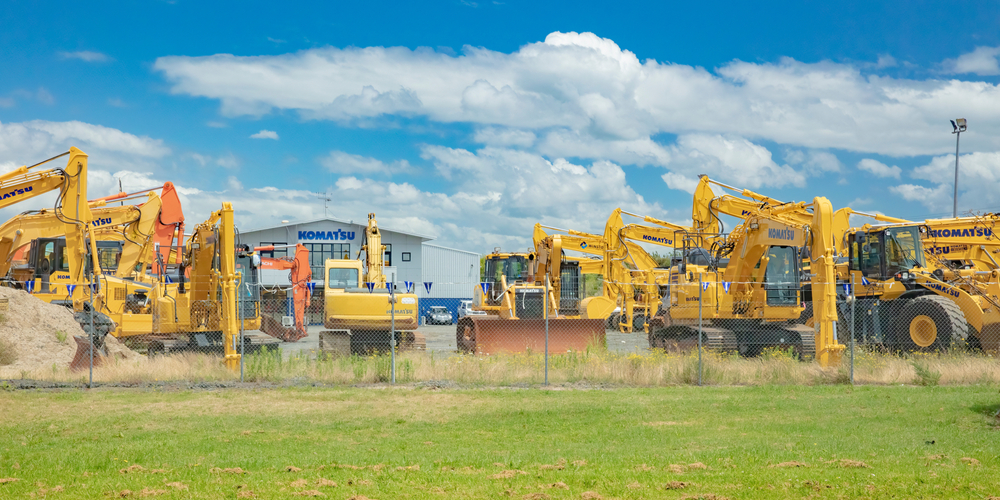Successful construction projects rely heavily on equipment procurement, a critical process that affects project timelines, budgets, and quality outcomes. Suppliers play a key role in this process, providing the necessary machinery and tools that ensure projects proceed as planned. Their expertise and services are essential in sourcing, delivering, and maintaining construction equipment.
An important aspect of equipment procurement involves understanding the ideal location of the load’s center of gravity when it is on the forks, as this can significantly impact the efficiency and safety of construction operations.
Importance of Equipment Procurement in Construction
The procurement of construction equipment is a cornerstone of project management, directly influencing project timelines, cost efficiency, and the quality of the final build. An effective equipment procurement strategy ensures that the necessary machinery is available when needed, is cost-effective, and meets the project’s quality requirements.
Such strategic procurement goes beyond mere transactional purchasing; it involves thorough planning, market research, and negotiations to secure the best deals on high-quality equipment. This approach not only streamlines project execution but also safeguards against delays and cost overruns, ultimately contributing to the project’s overall success.
Understanding the Supplier’s Role
Suppliers in the construction sector transcend the traditional role of equipment vendors to become indispensable partners in the execution of projects. Their contribution spans various critical areas, each ensuring the seamless progress and completion of construction projects:
Sourcing
The process of sourcing involves more than just the procurement of equipment. Suppliers leverage their networks and industry knowledge to procure a diverse array of construction equipment, from the simplest tools to the most sophisticated heavy machinery. This ensures that the specific needs of each project are met with precision. They assess the market for the latest technologies and innovations in construction equipment, aiming to provide solutions that enhance efficiency and productivity on-site.
Quality Assurance
Suppliers play a crucial role in quality assurance, rigorously ensuring that every piece of equipment meets the highest standards of quality and complies with all relevant regulations. This commitment to quality significantly reduces the risk of equipment failure, which can lead to costly delays and compromise project integrity. They implement stringent quality control measures, from initial procurement to delivery, safeguarding projects against potential setbacks.
Logistics
The logistical expertise of suppliers is critical in ensuring the timely delivery of equipment to construction sites. They manage complex logistics, considering transportation routes, delivery schedules, and the costs associated with equipment delivery. Suppliers also address assembly and installation requirements, ensuring equipment is not only delivered but also ready for immediate use, thereby minimizing downtime and enhancing project efficiency.
After-Sales Support
Beyond the sale, suppliers provide comprehensive after-sales support, including maintenance and repair services. For complex machinery, they may offer training sessions to ensure that construction teams can operate the equipment safely and efficiently. This ongoing support is vital for the operational longevity of the equipment, ensuring it remains functional and reliable throughout the project’s duration.
Their deep expertise and knowledge about construction equipment significantly influence the equipment selection process, guiding construction companies towards the best choices that align with their specific project requirements and goals.
Criteria for Selecting the Right Suppliers
The selection of suppliers is a strategic decision that impacts the overall success of equipment procurement. Key factors to consider in this selection process include:
1. Reliability
The reliability of suppliers is paramount. Suppliers with a proven track record of delivering high-quality equipment on time and within budget are invaluable. Their ability to consistently meet these expectations ensures smooth project execution and helps to avoid unforeseen delays and additional costs.
2. Product Range
A supplier with a broad product range offers greater flexibility in equipment selection, enabling construction companies to find precisely what they need under one roof. This diversity not only simplifies the procurement process but also opens up opportunities for optimizing equipment selection to meet project-specific requirements.
3. Compatibility with Project Requirements
It’s crucial for suppliers to have a deep understanding of the project’s specific needs. This enables them to offer tailored solutions that perfectly align with the project’s objectives, whether it’s in terms of equipment specifications, performance requirements, or compliance with environmental standards.
4. Cost-Effectiveness
Evaluating the total cost of ownership is critical. Beyond the purchase price, considerations such as maintenance expenses, operational costs, and the potential for equipment resale value must be factored into the decision-making process. Suppliers who offer competitive pricing, coupled with cost-effective maintenance and operational solutions, can contribute significantly to the economic viability of the procurement process.
5. Customer Service
Exceptional after-sales service is crucial. Suppliers that provide prompt and reliable maintenance and repair services can greatly minimize equipment downtime, ensuring that project timelines are not adversely affected. Additionally, suppliers who are committed to customer service are more likely to offer flexible solutions to unforeseen challenges, further enhancing project outcomes.
Challenges in Construction Equipment Procurement
The procurement process in construction is riddled with challenges that can impede project progress and escalate costs. Understanding these hurdles is crucial for developing strategies to overcome them:
Logistical Issues
The logistics involved in delivering equipment to construction sites are often complex and fraught with challenges. This is especially true for projects located in remote or difficult-to-access areas, where transportation options may be limited, and delivery routes may be prone to disruptions. Weather conditions, transportation infrastructure, and local regulations can further complicate delivery schedules, risking project timelines.
Supply Chain Disruptions
The construction equipment supply chain is vulnerable to various external factors, including market shortages, geopolitical events, and global pandemics. These disruptions can lead to significant delays and increased costs, impacting the availability of essential equipment. The agility of the supply chain and the ability of suppliers to navigate these disruptions are critical to maintaining project schedules and budgets.
Maintaining Quality Standards
One of the significant challenges in equipment procurement is ensuring that cost-effectiveness does not compromise equipment quality. High-quality equipment is essential for project success, as it reduces the risk of failure and ensures compliance with safety and environmental standards. Balancing quality with cost requires a thorough understanding of equipment specifications and a strategic approach to procurement that does not sacrifice essential quality markers for price.
The right suppliers can be invaluable in addressing these challenges. Their expertise, knowledge of the market, and logistical capabilities enable them to mitigate risks effectively, ensuring that projects remain on track despite the complexities of equipment procurement.
Best Practices for Effective Equipment Procurement
Optimizing the equipment procurement process is essential for the success of construction projects. Several best practices can be adopted to enhance efficiency, sustainability, and cost-effectiveness:
1. Develop Strong Relationships with Suppliers
Establishing strong, trust-based partnerships with suppliers is fundamental. These relationships can lead to more favorable procurement terms, enhanced collaboration, and access to expert advice and support.
Suppliers that understand your project’s specific needs and priorities can offer tailored solutions and flexible terms, which are invaluable in addressing project challenges effectively.
2. Leverage Technology
Technology plays a crucial role in streamlining the equipment procurement process. By utilizing procurement software and platforms, construction companies can automate and optimize procurement tasks, from supplier selection to order tracking. These technologies enable efficient management of procurement activities, ensuring accurate and timely information flow and facilitating better decision-making.
3. Adopt Sustainable Procurement Practices
Sustainability is increasingly becoming a priority in the construction industry. Adopting sustainable procurement practices involves selecting equipment that minimizes environmental impact, such as machinery with lower emissions or energy consumption.
Prioritizing suppliers that offer eco-friendly options not only contributes to environmental goals but can also lead to long-term cost savings and compliance with regulatory standards. Sustainable procurement practices demonstrate a commitment to environmental stewardship and can enhance a company’s reputation in the market.
Conclusion
The role of suppliers in construction equipment procurement is indispensable. Their expertise, reliability, and service quality directly impact the success of construction projects. By understanding the importance of this role, carefully selecting the right suppliers, and employing best practices in procurement, construction companies can significantly improve project outcomes.
As the construction industry continues to evolve, the relationship between construction firms and their equipment suppliers will remain a critical component of project success.









